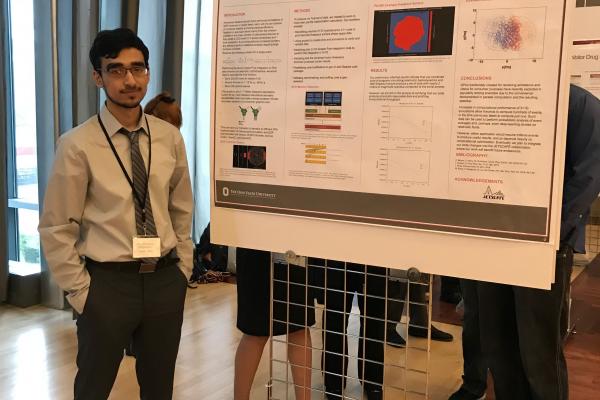Undergraduate Student Researcher, Sameed Pervaiz awarded a top-tier Denman award

Sameed Pervaiz, undergraduate researcher working with Professor Ulrich Heinz's group has been notified that he has been awarded as a top-tier Denman Undergraduate Researcher. Sameed is studying the dynamical evolution of heavy-ion collisions using viscous hydrodynamics and porting some of the code to GPUs. His project for the Denman Undergraduate Forum was entitled "Massively parallel quark-gluon plasma freezeout simulations with CUDA and OpenCL."
Sameed provided the following information describing his project and his interactions with Prof. Heinz's group. - "I'm currently working with other group members on taking various simulation programs for the dynamical evolution of heavy ion collisions and helping port them to utilize GPUs more commonly used for animation and computer rendering. The computations involved in doing calculations on a large grid are very numerous, and the computer industry had, in recent history, discovered issues (heat, electricity, namely) in trying to push single processor computer performance as high as possible. So there was this paradigm shift in computer architecture towards putting multiprocessors in consumer and professional machines to exploit the parallel nature of many tasks, one of which happened to be scientific computing. Since our problems tend to be similar but independent calculations, we can gain significant speedups by performing these tasks on GPUs, which can be thought as thousands of processors working in lockstep.
However, much of the fun comes from the fact that I'm not just an undergraduate code monkey. Prof. Heinz and the other group members genuinely care for my understanding of the physics, so if I were to voice my confusion on where our project stands in the larger scope of QCD, or even in the broad scheme of physics itself, Dr. Heinz would forward me an arXiv article explaining such things. If I had to polish my understanding of the basic theory, ask for technical clarifications (especially before a presentation), or ask for feedback on a certain technique or algorithm, other group members like Derek or Gojko would have no issues sitting down with me for an hour and discussing physics or computers. I really think I'm lucky that Dr. Heinz let me join his group during the spring of my freshman year, because I truly enjoy it; otherwise I wouldn't be trying to debug code or plot images (maybe even in parallel) at 2 in the morning".
